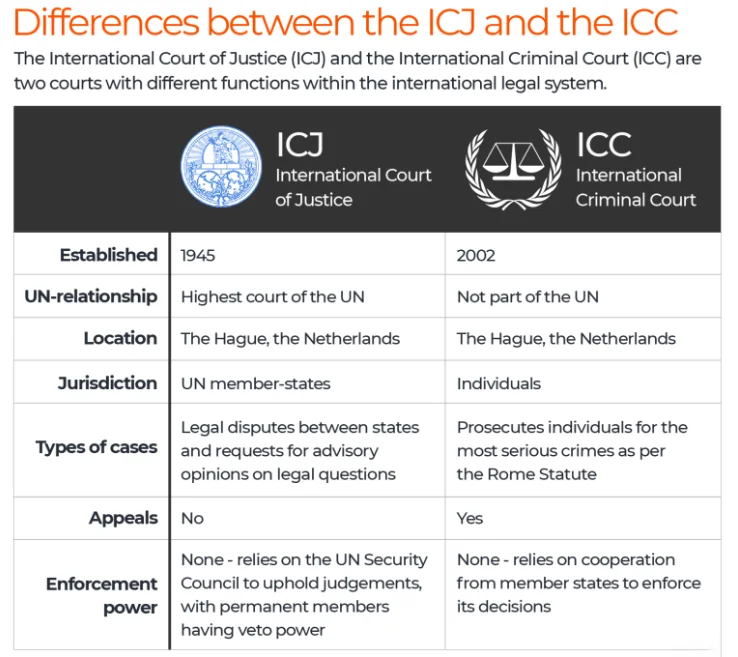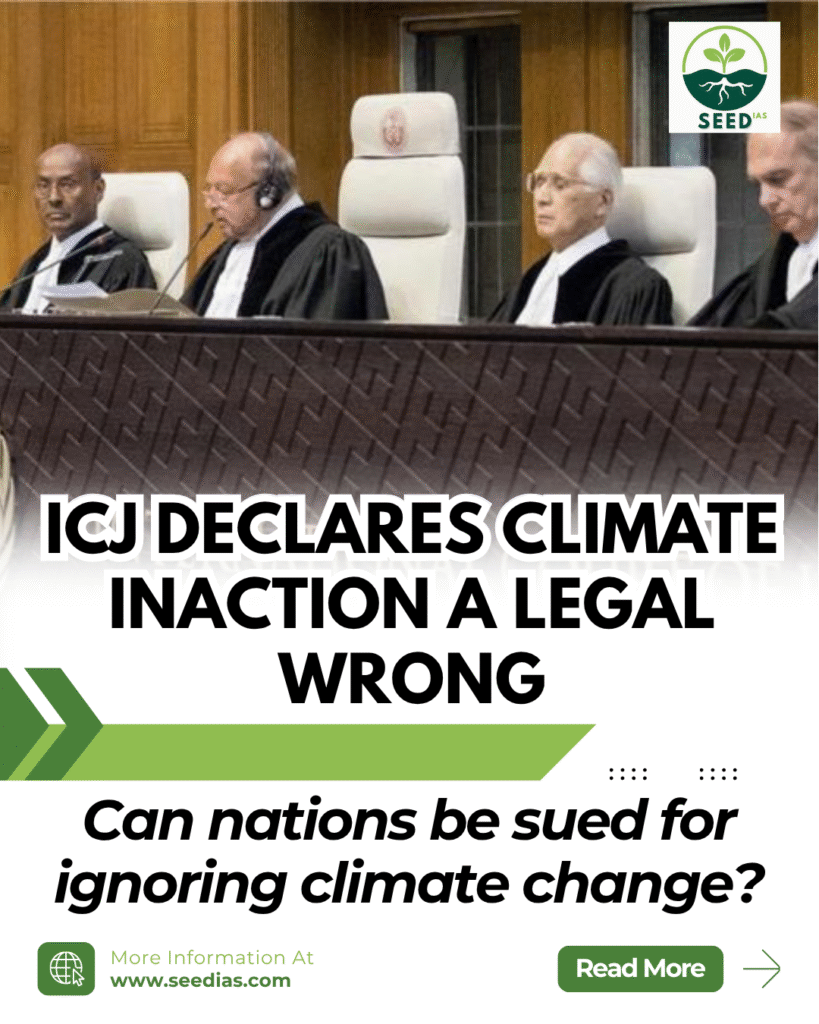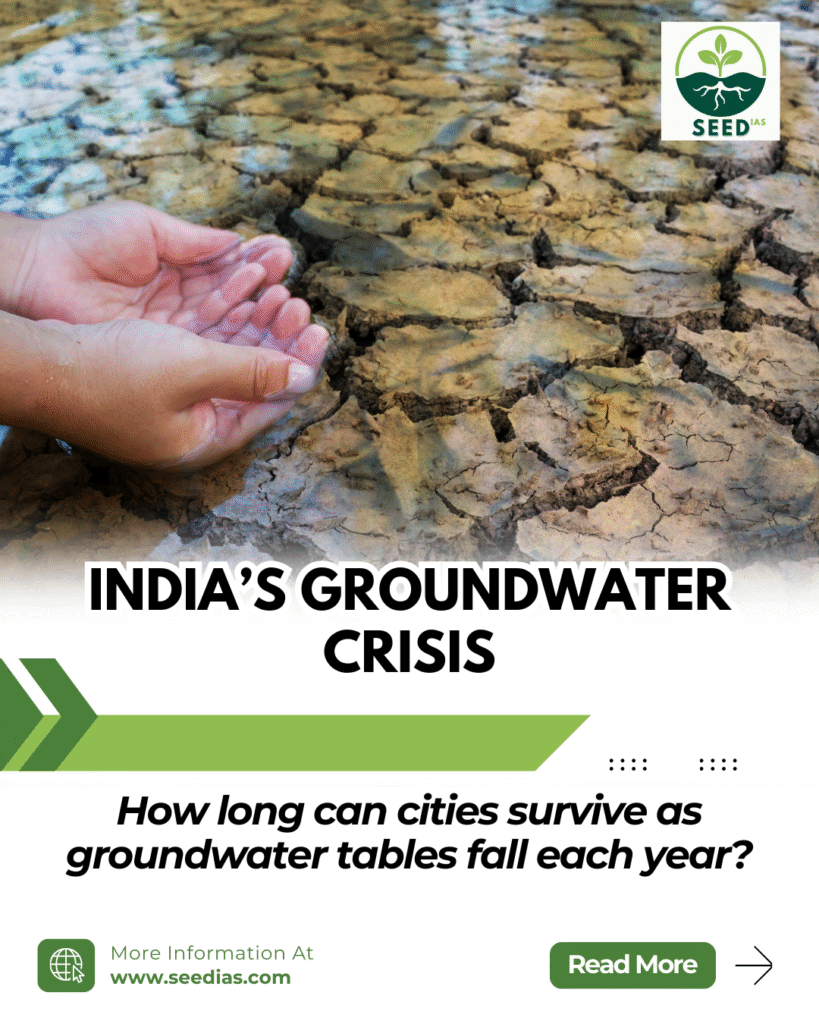Why in NEWS
The International Court of Justice (ICJ) issued an advisory opinion declaring that countries can be held legally responsible under international law for failing to act on climate change, reinforcing global calls for climate justice and accountability.
Key Terms/Concepts
| Term | Explanation |
|---|---|
| ICJ | UN’s top judicial body for settling disputes between states and giving legal opinions |
| Advisory Opinion | A non-binding legal interpretation by the ICJ on international legal questions |
| Climate Reparations | Compensation by high-emitting nations to vulnerable countries for climate damage |
| Loss and Damage | UNFCCC mechanism to provide support for countries facing climate-related harm |
| Annex I Countries | Industrialised nations with historical responsibility for emissions under UNFCCC |
ICJ’s Stance on Climate Obligations
| Principle | Details |
|---|---|
| Legal Duty | States are legally obligated to mitigate emissions and adapt to climate change under multiple treaties |
| Future Generations | States must consider long-term environmental protection for future populations |
| Wrongful Act | Failure to act is an internationally wrongful act, triggering legal responsibility |
| Reparations | Victim countries may claim compensation, cessation, or guarantees of non-repetition |
| Developed Nations | Must lead mitigation and provide financial/technical support to developing countries |
| Human Rights Link | Climate action is part of fulfilling international human rights obligations |
Significance of the Advisory Opinion
| Impact | Explanation |
|---|---|
| Legal Accountability | Sets the groundwork for future climate litigation globally |
| Boosts Climate Justice | Strengthens developing nations’ demand for loss and damage funding |
| COP30 Influence | Likely to shape negotiations and climate finance at COP30 in Brazil |
| Global Precedent | May be used in national courts and by UN bodies for pushing stronger climate laws |
About the International Court of Justice (ICJ)
| Feature | Details |
|---|---|
| Establishment | Created in 1945, operational since 1946 |
| Role | Settles legal disputes between states and gives advisory opinions |
| Location | The Hague, Netherlands |
| Binding Nature | Judgments are binding; advisory opinions are non-binding but influential |
| Language | English and French |
| Composition | 15 judges, elected for 9-year terms by the UNGA and UNSC |
India and the ICJ
| Case | Outcome |
|---|---|
| Right of Passage (Portugal v. India, 1960) | India upheld sovereignty while allowing civilian passage |
| Kulbhushan Jadhav Case (India v. Pakistan, 2019) | ICJ ruled in favour of India on consular access under Vienna Convention |

In a nutshell
Memory Code: LAW-FIRM
L – Legal duty
A – Accountability for inaction
W – Wrongful act under law
F – Future generations protected
I – ICJ’s global influence
R – Reparations promoted
M – Mitigation by developed countries
Prelims Practice Questions
- Which of the following is true regarding the ICJ’s advisory opinions?
a) They are legally binding on all UN members
b) They settle disputes between individuals
c) They are non-binding but influential interpretations of law
d) They must be reviewed by the UN Security Council - The ICJ’s recent advisory opinion on climate change holds that:
a) Only developed countries are responsible for climate action
b) Climate inaction is an internationally wrongful act
c) Climate treaties are not legally enforceable
d) Human rights are separate from climate change obligations - Which treaty does not contribute to a country’s legal obligations on climate action?
a) UNFCCC
b) Convention on Biological Diversity
c) Law of the Sea
d) WTO Agreement on Trade-Related Aspects of IPR
Mains Questions
- The ICJ’s climate advisory opinion signals a paradigm shift in the legal accountability of states. Discuss its implications for global climate governance.15 Marks (GS2 – International Institutions, GS3 – Environment)
- Examine how the linkage between climate change and human rights strengthens the demand for climate justice. 10 Marks (GS3 – Environmental Governance & Ethics)
Answers with Explanations (Prelims)
| Ques | Answer | Explanation |
|---|---|---|
| 1 | c) Non-binding but influential | ICJ advisory opinions guide international law but aren’t binding |
| 2 | b) Climate inaction is a wrongful act | ICJ stated failure to act on climate change violates international law |
| 3 | d) WTO TRIPS | TRIPS is unrelated to environmental treaties or climate obligations |














